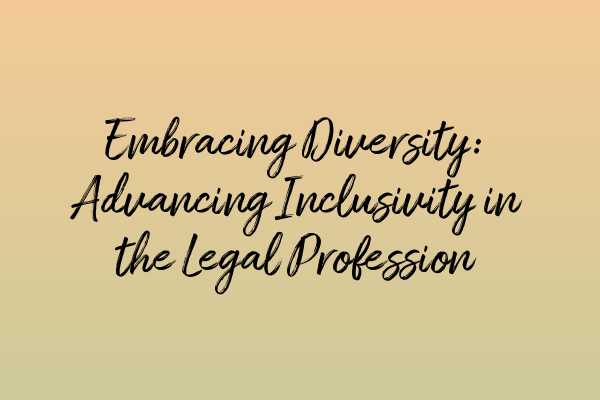Embracing Diversity: Advancing Inclusivity in the Legal Profession
As we progress towards a more diverse and inclusive society, it is crucial for the legal profession to reflect these values. Embracing diversity not only promotes fairness and equality, but it also has significant benefits for the legal profession as a whole. In this blog post, we will explore the importance of diversity in the legal profession and how it can be advanced to create an inclusive environment for all.
The Benefits of Diversity in the Legal Profession
Diversity brings a wide array of perspectives, experiences, and ideas to the table, which in turn enhances problem-solving, creativity, and innovation. When legal professionals come from different backgrounds, they bring unique insights that can lead to more well-rounded and effective decisions. Additionally, diverse legal teams have been shown to have better client relationships, as they can more easily connect with a wider range of clients and understand their needs.
In a rapidly globalizing world, diversity is also crucial for the internationalization of the legal profession. Clients often come from diverse cultural backgrounds, and having legal professionals who can understand and navigate different cultural norms and practices is invaluable. By embracing diversity, the legal profession can better serve its clients and stay competitive in a global market.
Promoting Inclusivity in Hiring Practices
To advance inclusivity in the legal profession, it is essential to address biases and barriers in hiring practices. When recruiting new talent, firms and organizations should aim to create a level playing field and ensure equal opportunities for all candidates. Implementing blind recruitment practices, where names and identifying information are removed from resumes, can help mitigate unconscious biases and promote merit-based selection.
Furthermore, organizations should actively seek out candidates from diverse backgrounds and provide support and mentorship programs to help them succeed in the legal profession. Offering internships and work experience opportunities to underrepresented groups can also help bridge the gap and provide valuable hands-on training and exposure to the legal field.
Creating a Supportive and Inclusive Work Environment
While hiring practices play a significant role in advancing diversity, it is equally important to create a supportive and inclusive work environment. This can be achieved through various initiatives, such as diversity training programs, employee resource groups, and regular evaluation of workplace policies and practices to ensure they are inclusive and unbiased.
Mentorship and sponsorship programs can also be effective in fostering diversity and inclusivity. Pairing individuals from diverse backgrounds with experienced professionals who can provide guidance and support can empower them to succeed and thrive in the legal profession.
Educating and Raising Awareness
Education and raising awareness about diversity and inclusion issues in the legal profession are crucial for effecting change. Law schools and legal organizations should incorporate diversity and inclusion training into their curriculum and professional development programs. By educating future legal professionals about the importance of diversity and providing them with the tools to recognize and address biases, we can create a generation of lawyers who are committed to promoting inclusivity.
Additionally, legal publications and conferences should highlight diverse voices and perspectives to enrich the discourse and challenge existing norms. By amplifying diverse voices, we can promote a more inclusive and representative legal profession.
Conclusion
Embracing diversity and advancing inclusivity in the legal profession is not only a moral imperative but also a strategic business decision. The benefits of diversity in fostering innovation, improved decision-making, and better client relationships cannot be overstated. By promoting inclusivity in hiring practices, creating a supportive work environment, and educating legal professionals, we can create a legal profession that truly represents and serves our diverse society.
Related Articles:
- Private Prosecutions: Exploring Non-Governmental Prosecutions in Criminal Cases
- Rights of the Accused: Protecting Individual Liberties in Criminal Proceedings
- Magistrates’ Court vs Crown Court: Understanding Key Differences
- Protecting Vulnerable Witnesses in Criminal Trials: Best Practices and Legal Safeguards
- Unraveling the Complexities of UK Bail Laws


Leave a Reply